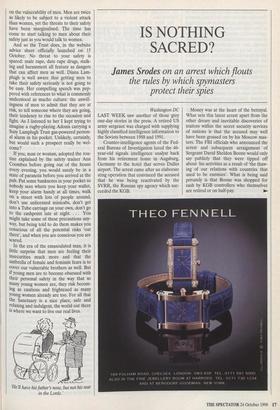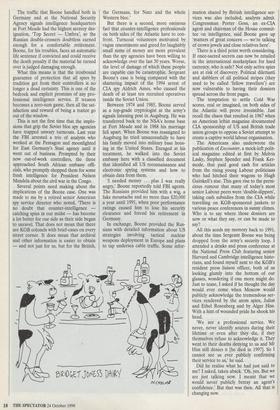IS NOTHING SACRED?
James Srodes on an arrest which flouts
the rules by which spymasters protect their spies
Washington DC LAST WEEK saw another of those grey one-day stories in the press. A retired US army sergeant was charged with supplying highly classified intelligence information to the Soviets between 1988 and 1991.
Counter-intelligence agents of the Fed- eral Bureau of Investigation lured the 46- year-old signals intelligence analyst back from his retirement home in Augsburg, Germany to the hotel that serves Dulles airport. The arrest came after an elaborate sting operation that convinced the accused that he was being reactivated by the SVRR, the Russian spy agency which suc- ceeded the KGB. Money was at the heart of the betrayal. What sets this latest arrest apart from the other dreary and inevitable discoveries of traitors within the secret security services of nations is that the accused may well have been grassed on by his Moscow mas- ters. The FBI officials who announced the arrest and subsequent arraignment of Sergeant David Sheldon Boone would only say publicly that they were tipped off about his activities as a result of 'the thaw- ing of our relations with countries that used to be enemies'. What is being said privately is that Boone was shopped for cash by KGB controllers who themselves are retired or on half-pay. The traffic that Boone handled both in Germany and at the National Security Agency signals intelligence headquarters at Fort Meade had the highest secrecy des- ignation, 'Top Secret — Umbra', so the Russian double-crossers doubtless earned enough for a comfortable retirement. Boone, for his troubles, faces an automatic life sentence if convicted and could receive the death penalty if the material he turned over is judged damaging enough.
What this means is that the ironbound guarantee of protection that all spies by tradition get from their controllers is no longer a dead certainty. This is one of the bedrock and explicit promises of any pro- fessional intelligence service. If treason becomes a zero-sum game, then all the sat- isfaction and reward of being a traitor go out of the window.
This is not the first time that the implo- sions that grip the Soviet bloc spy agencies have trapped unwary turncoats. Last year the FBI arrested a trio of analysts who worked at the Pentagon and moonlighted for East Germany's Stasi agency until it went out of business. Prompted by their now out-of-work controllers, the three approached South African embassy offi- cials, who promptly shopped them for some fresh intelligence for President Nelson Mandela about the civil war in the Congo.
Several points need making about the implications of the Boone case. One was made to me by a retired senior American spy service director who noted, 'There is no doubt that counter-intelligence — catching spies in our midst — has become a lot better for our side as their side began to unravel. That does not mean that there are KGB colonels with brief-cases on every street corner. It does mean that archival and other information is easier to obtain — and not just for us, but for the British, the Germans, for Nato and the whole Western bloc.'
But there is a second, more ominous fact that counter-intelligence professionals on both sides of the Atlantic have to con- front. Turncoat volunteers motivated by vague resentments and greed for laughably small sums of money are more prevalent than the spy agencies have been willing to acknowledge over the last 30 years. Worse, the level of damage of which these people are capable can be catastrophic. Sergeant Boone's case is being compared with the shattering impact of the 1994 arrest of CIA spy Aldrich Ames, who caused the death of at least ten recruited operatives inside the Soviet Union.
Between 1974 and 1985, Boone served as a top-grade cryptologist at the army's signals listening post in Augsburg. He was transferred back to the NSA's home base at Fort Meade and in 1988 his marriage fell apart. When Boone was reassigned to Augsburg he tried unsuccessfully to have his family moved into military base hous- ing in the United States. Enraged at his treatment, he walked into the Soviet embassy here with a classified document that identified all US reconnaissance and electronic spying systems and how to obtain data from them.
'I needed money . . . plus I was really angry,' Boone reportedly told FBI agents. The Russians provided him with a wig, a fake moustache and no more than $20,000 a year until 1991, when poor performance ratings caused him to lose his security clearance and forced his retirement in Germany.
In exchange, Boone provided the Rus- sians with detailed information about US strategies involving tactical nuclear weapons deployment in Europe and plans to tap undersea cable traffic. Some infor- mation shared by British intelligence ser- vices was also included, analysts admit. Congressman Porter Goss, an ex-CIA agent and chairman of the House commit- tee on intelligence, said Boone gave up 'matters of great concern — we're talking of crown jewels and close relatives here'.
There is a third point worth considering. If once-sacred secrets can now be retailed in the international marketplace for hard currency, who is safe? Not only active spies are at risk of discovery. Political dilettanti and dabblers of all political stripes (they used to be called 'fellow travellers') are now vulnerable to having their dossiers spread across the front pages.
The temptation to settle Cold War scores, real or imagined, on both sides of the Atlantic will prove irresistible. Just recall the chaos that resulted in 1967 when an American leftist magazine documented CIA sponsorship of US and British trade union groups to oppose a Soviet attempt to create a captive world labour organisation.
The Americans also underwrote the publication of Encounter, a mock-left polit- ical magazine edited at first by Melvin Lasky, Stephen Spender and Frank Ker- mode, that paid good cash for articles from the rising young Labour politicians who had hitched their wagons to Hugh Gaitskell's star. This gave rise to the perni- cious rumour that many of today's most senior Labour peers were 'double-dippers', taking cash subsidies from the CIA while travelling on KGB-sponsored junkets to various peace conferences in sunny climes. Who is to say where those dossiers are now or what they say, or can be made to say?
All this sends my memory back to 1991, about the time Sergeant Boone was being dropped from the army's security loop. I attended a drinks and press conference at the National Press Club featuring senior Harvard and Cambridge intelligence histo- rians, and found myself next to the KGB's resident press liaison officer, both of us looking glumly into the bottom of our glasses, wondering if one more might do. Just to tease, I asked if he thought the day would ever come when Moscow would publicly acknowledge the tremendous ser- vices rendered by the atom spies, Julius and Ethel Rosenberg and by Alger Hiss. With a hint of wounded pride he shook his head.
'We are a professional service. We never, never identify sources during their lifetime or even after they die, if they themselves refuse to acknowledge it. They went to their deaths denying to us and Mr Hiss still denies it [he died in 19971. So I cannot see us ever publicly confirming their service to us,' he said.
Did he realise what he had just said to me? I asked, taken aback. 'Oh, yes. But we are just talking now. I meant that we would never publicly betray an agent's confidence.' But that was then. All that is changing now.



















































































 Previous page
Previous page